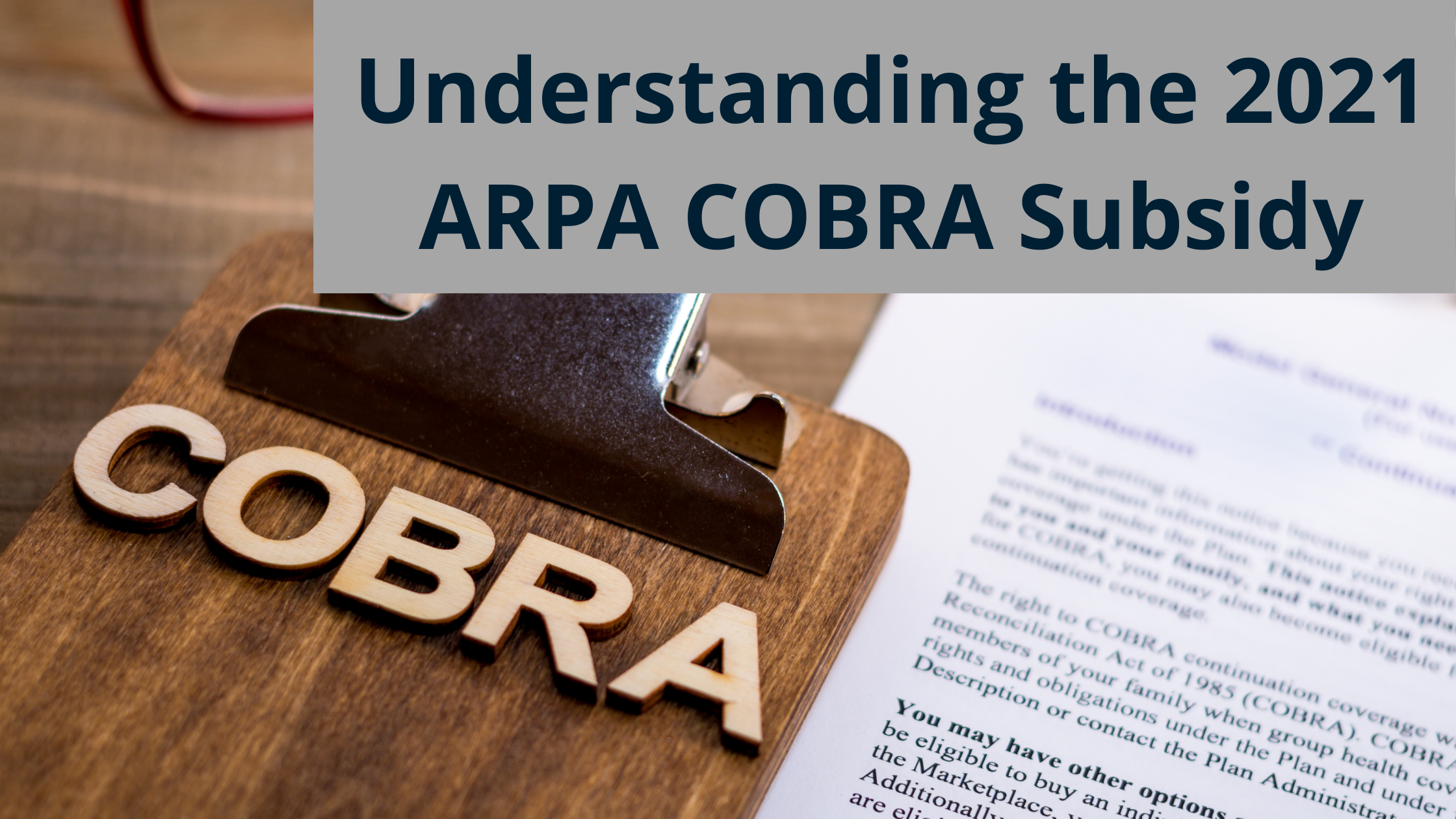ARPA COBRA Subsidy Eligibility Complicates COBRA Administration

One significant provision of the new American Rescue Plan Act (ARPA) (H.R. 1319) is the COBRA subsidy eligibility mandates. This provision will complicate COBRA administration for all employers who are currently already bound by COBRA. Typical of COBRA laws, ARPA has the same burdens COBRA is known for; tight time constraints, look back eligibility periods, dates unique to each individual situation, as well as Notice obligations with specific language which have not yet been released.
As with many COVID-19 related laws, this new COBRA subsidy eligibility benefit will put an additional burden on employers to comply. The new COBRA Premium Subsidy Law requires prompt action by employers to audit and notify eligible individuals and administer COBRA enrollment for those that want to enroll. The new COBRA provision also swaps premiums responsibility from the individual to the employer. The COBRA subsidy will be fonted by the employer and later reimbursed by the federal government through payroll tax credits.
COBRA Subsidy Eligibility
Pursuant to the ARPA, a temporary 100% reduction in premiums for COBRA continuation must be offered to eligible individuals. Starting on April 1, those who are entitled to COBRA coverage any time between April 1, 2021 through September 30, 2021 due to a loss of coverage under a group health plan resulting from involuntary loss of employment or reduction of hours, will have their COBRA premium due within such period fully subsidized.
The involuntary termination or reduction in hours does not have to be COVID-related for subsidy eligibility purposes. The subsidy applies for up to six months of coverage from April 2021 through September 2021 (unless the individual’s maximum COBRA period expires earlier).
For group plans subject to the federal COBRA rules, the employer will be required to pay the COBRA premium upfront but then will be reimbursed through a refundable payroll tax credit.
Retroactive COBRA Subsidy Eligibility
Although this COBRA provision takes effect April 1, 2021, employees who were terminated earlier but are still in their COBRA election window also are eligible This means the subsidy is available to individuals who lost coverage and became eligible for COBRA prior to April 1, 2021 and remains opened for the duration of the entire time that individuals normally could remain on the group health plan as COBRA participants (18 months), if the 18 month time period includes any month between April and September of 2021. This applies even if coverage wasn’t elected initially during the election time period provided under COBRA, AND even if it was elected and then later discontinued prior to April 1, 2021.
Generally, this means anyone who became eligible for COBRA as far back as November 2019, whose separation was involuntary, will receive another opportunity to elect coverage that is 100% subsidized and at no cost to them simply because their 18 months of coverage would extend through April 2021.
Employers will need to work with their group health plan carriers and vendors on how the lookback period will affect each involuntarily separated employee to determine if they are eligible for COBRA under ARPA, and then determine how long they can remain on the plan as a COBRA participant. Once that is determined then notification must go out to each of them timely.
COBRA Notice Requirements
The ARPA requires plan sponsors to notify individuals that qualify for COBRA subsidy eligibility about the availability and expiration of this benefit. There is no model notice just yet, but the DOL should be issuing one by April 10. It is recommended that employers enact a “wait and see” and not try to create their own notices. Plans should, however, start to identify who needs to receive the notice and consider whether to permit individuals to enroll in different coverage if they are already enrolled in coverage. COBRA participants may prefer to elect the plan with increased coverage which before they failed to elect due to the cost of the premium. The ARPA allows, but does not require, providing participants that option.
Small Employers
Employers with fewer than 20 workers usually are exempt from the federal COBRA rules, but their group medical insurance plans may be subject to a state’s mini-COBRA law. In that case, most states place the burden of administering COBRA on the insurance carriers and therefore ARPA will also place the burden on the carriers to front the subsidized premium and collect the reimbursement by by the government.
Note that the COBRA subsidy doesn’t apply during FFCRA leaves because employees are entitled to maintain their health insurance during those leaves on the same terms as though they had continued to work. If however, the employees leave was extended past the obligated time period under FFCRA, as an accommodation under disability discrimination laws, they may be eligible to elect for coverage under ARPA COBRA.
OnePoint HCM Benefits Administration and COBRA Solutions
When new legislation is enacted it is more important than ever to have the right HCM systems in place to be able to adapt to and easily comply with changing legal requirements. Unified HR technologies like OnePoint HCM lessen the effort to access employee data like COBRA lookback periods to make sure you are meeting new employer obligations.
A single HR data infrastructure also opens new opportunities for efficiency by easy adding Turnkey COBRA administration solutions that minimize the manual tasks for the HR team. Contact OnePoint HCM to discuss ways to streamline Benefits Administration and COBRA with our all-in-one platform.
Subscribe to updates
Get the latest posts delivered to your inbox.